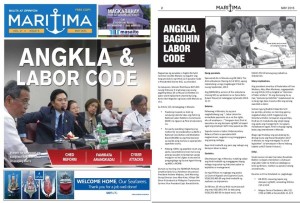
Through legislative fiat, ANGKLA partylist is throwing off-balance the already imbalanced legal battle on seafarers claims.
Every labor dispute is a David and Goliath battle as it involves two opposing parties: the worker on one side and the management on the other, for monetary claims for disability and death benefits, illegal dismissal as well as unpaid or underpayment of salaries and wages.
ANGKLA has consistently used the phrase “ balancing the interest of the seafarer and the company” when it filed the proposed bill (House Bill No. 5430) that aimed to delay the execution of the monetary judgment award issued by the National Labor Relations Commission (NLRC) and the National Conciliation and Mediation Board (NCMB) in favor of a seafarer. It is the twin bill of the new law, the so-called “Seafarers’ Protection Act
By placing the proceeds in escrow until such time the finality of the decision issued by the appropriate appellate court (Supreme Court or Court of Appeals), in the end, the “balance of scale” will tilt more to capital as this will protect the business interest of the manning agencies and their principal rather than the seafarers themselves.
In essence, ANGKLA echoed the employer’s phrase “ benefits even beyond the claims they are actually entitled ” to sanitize the problematic legal battle for seafarer’s compensation.
Valid claims, employers argue, necessarily must follow what the POEA contract dictates: a contract that contains terms and conditions formulated more favorable to his employer and is littered with ambiguous provisions, generalizations, technicalities that he does not understand.
Under the 1996 POEA Standard Employment Contract (SEC), for disability or death to be compensable, it was sufficient that the seafarer suffered injury or illness during the term of his employment. The cause of illness or death is immaterial.
However, through the lobbying of the principals and their manning agencies, the restrictive clause “work-related” was added under Section 20 (B) of the 2000 POEA SEC to limit their liabilities. The 2000 POEA SEC defined “work-related injury” as “injury(ies) resulting in disability or death arising out of and in the course of employment” and “work-related illness” as “any sickness resulting to disability or death as a result of an occupational disease listed under Section 32-A of the contract”. Being included in the list is not enough, since all of the conditions must be satisfied.
Through such restrictive provisions of the POEA SEC, claims for disability or death compensation became a legal battleground, especially in instances when seafarers do not receive full or proper compensation that are legally entitled to have. Such emergence of cases is attributable to the fact that the seafarer’s employer does not hesitate to harness its immense resources to limit its liability.
In reality, the grading system assessment under the POEA Contract is not reflective of the benefits that should be given to the seafarer. There are medical conditions that are classified as partial disability (between Grade 2 to 14) but in essence should have been considered as total permanent (Grade 1). The problem can be partly attributed to the Supreme Court’s observation on the proliferation of obviously biased company doctor whose “findings cannot be taken as gospel truth, palpably self-serving and certainly could not be considered independent” as their “loyalty rests completely upon the company they serve”. From the business point of view, it will be risky for the employers to let the seafarer be re-employed since the harsh working environment might only aggravate his fragile condition and in the end expose the company to more serious insurance liabilities.
Unless their definition of “valid claims” is changed, through the deletion of the “work-related” clause, and through the reversion to the old 1996 POEA Contract , the denials of seafarers’ claims will continue. The compensation scheme should be less restrictive and more realistic, Otherwise, their only recourse is to seek legal assistance from lawyers of their own choosing. Conversely speaking, give the seafarers what they should must receive, and employers will not be hounded by legal cases.
And expectedly, ANGKLA will not pursue the total deletion of the “work related clause” since this will run counter to the business interest of the employers.
In fact, ANGKLA filed House Bill No. 5430 that aimed to amend the labor code that will have significant impact on labor claims governing the immediately “final and executory” nature of decisions issued by NLRC/NCMB. The seafarer will wait for longer years before they receive the award by the NLRC/NCMB, ANGKLA proposes that the proceeds of execution shall be deposited in an escrow account to ensure the restitution of monetary awards in case the appropriate appellate court annuls or partially or totally reverses the monetary judgment.
Labor litigation is not an overnight event, In most cases, the elevation of the records alone from the NLRC/NCMB to the Court of Appeals or Supreme Court will take several years.. ANGKLA justifies the Escrow bill to ensure that the seafarer will still receive the award in the future in the event that the manning agency close down. However, ANGKLA disregarded the fact that in cases of seafarers with medical conditions, some incur huge debts to sustain their medication while others die before the decision by the Supreme Court is released forcing the seafarers into accepting an ex-gratia, miniscule amount Companies have the legal remedies to recover the amount, but one cannot reclaim the life of the deceased claimant.
It is election time again. Be critical of the real colors.
Source: Pinoy Seafarers’ Rights

Atty. Dennis R. Gorecho obtained his B.S.Economics (Dean’s Medalist,1991) and Bachelor of Laws (1998) from the UP Diliman, admitted to the bar April 1999. He joined Sapalo Velez Bundang Bulilan (SVBB) law offices in 2001 and now Junior Partner who heads the seafarers’ division. Under his leadership, the SVBB actively champions seafarers’ rights through the holding of year-round, nationwide seminars to inform seafarers of their rights and legal measures to enforce them. He actively participated in the drafting of various legal documents pertaining to seafarers. He is part of the board of trustees for the Maritime Law Association of the Philippines (MARLAW), Maritime Forum, the National Seafarers Day (NSD) committee He is a legal commentator on maritime issues on print, radio and TV. A co-anchor of the radio program Bantay OCW Usapang Marino aired over Radio Inquirer every Wednesday 10:30am to 12noon.
Email: info@sapalovelez.com; drg@sapalovelez.com
